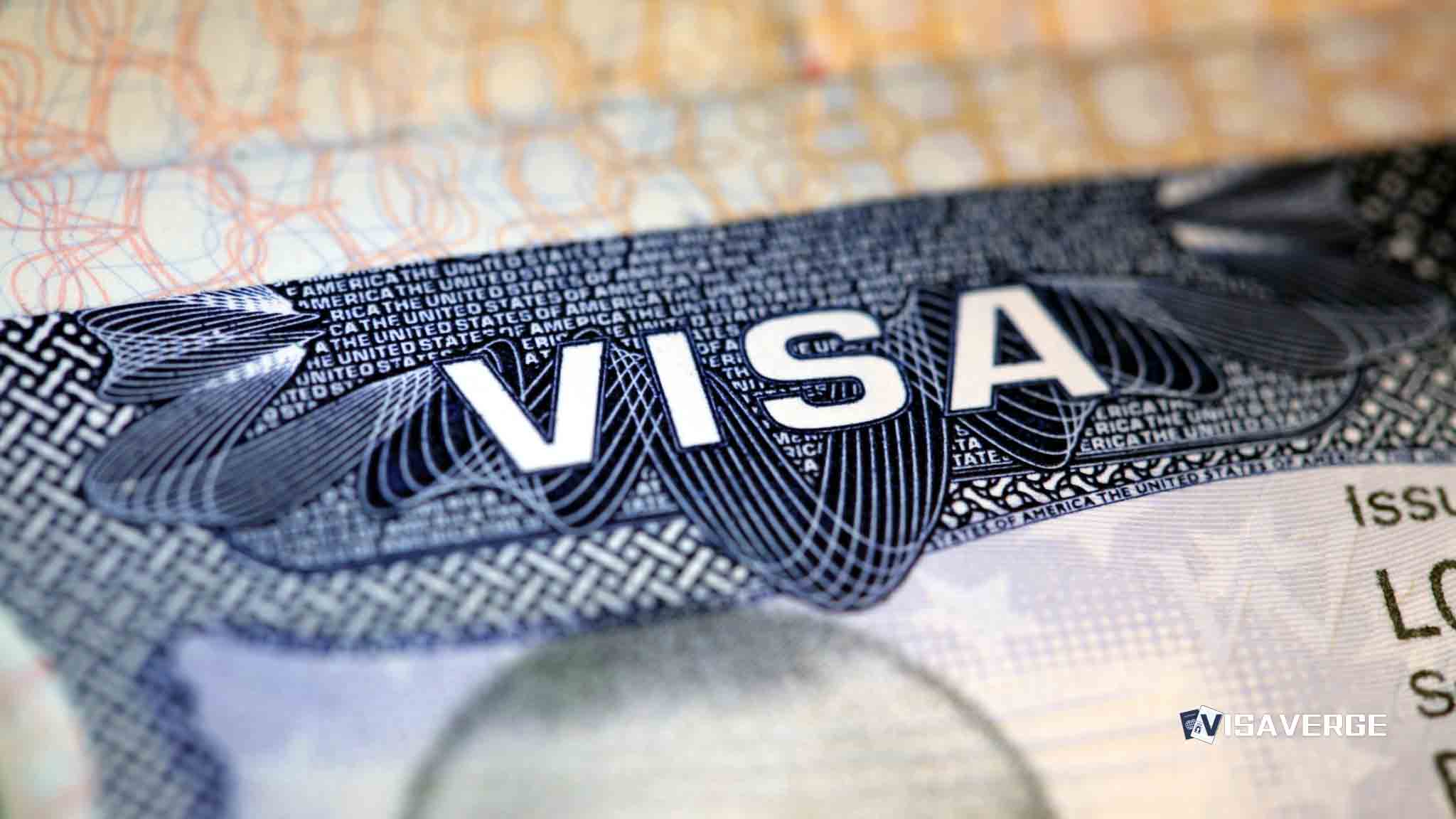(UNITED STATES) A tightening of U.S. visa rules and processing capacity has thrown the plans of many Chinese Christian families into disarray this summer, as students headed for Christian schools and colleges face sudden roadblocks. A new Presidential Proclamation effective June 9, 2025 restricts entry and visa issuance for nationals of several countries, including China. Chinese applicants can still submit applications and attend interviews, but many now fall into categories deemed ineligible for visa issuance or admission.
At the same time, the U.S. Embassy in China reports sharp limits on staffing imposed by the PRC government, leaving consular sections able to process roughly half the number of applications compared with last summer. Combined with rising demand, appointment wait times have surged, and families say their children’s education plans are on hold amid severe U.S. visa uncertainty.

Consular officers have also rolled out stricter vetting. All F, M, and J visa applicants must now keep their social media profiles set to public to support identity checks and admissibility reviews. Parents worry routine posts could be misread or pulled out of context. The change comes as applicants already face longer security checks, making it harder to predict when—if at all—visas will be issued in time for fall start dates.
The shock extends beyond students. A critical path for church staff closed when the Employment Fourth Preference Certain Religious Workers (SR) category expired at midnight on March 13, 2025, meaning no SR visas could be issued or adjusted after that point and no new admissions were permitted on or after March 14, 2025. Church-sponsored programs that once supported schooling and exchanges for families now lack a visa channel, leaving pastors, youth workers, and their dependents without options they relied on for years.
Families report increased questioning around faith, church activity, and community ties at visa interviews. While consular officers have wide discretion and must assess ties to the home country, the perception among many Chinese Christian families is that religious identity can trigger extra scrutiny or delay. School counselors at Christian institutions say they’ve seen a sharp drop in Chinese applicants who can secure timely F-1 or J-1 visas, and some accepted students have deferred enrollment because they can’t get to the United States 🇺🇸 by the first day of class.
Policy shifts and processing strains
The June proclamation—formally titled the “Presidential Proclamation on Restricting the Entry of Foreign Nationals to Protect the United States from Foreign Terrorists and Other National Security and Public Safety Threats”—is the most prominent policy change of 2025 for this group. It does not bar Chinese nationals from applying, but it has added layers of ineligibility findings that consular officers must evaluate.
For families, the effect is simple and stark: students can attend interviews and still walk away empty-handed, even with strong school offers and full financial support.
Meanwhile, processing capacity in China remains constrained. Due to continuing PRC restrictions on U.S. diplomatic staffing, embassy and consulate teams are handling roughly half the summer workload they would normally process. That bottleneck, combined with seasonal demand for student visas, has lengthened every step from appointment booking to document review and passport return.
Even applicants who clear the proclamation’s hurdles face unpredictable queues and administrative processing. New vetting norms extend into daily life online: applicants for F-1 (academic), M-1 (vocational), and J-1 (exchange visitor) visas must keep their social media settings public, a shift families say feels intrusive but unavoidable.
Consular officers are asking more detailed questions, not just about a major or a school’s location, but about:
- Church involvement and religious activities
- Family networks and community ties
- Career plans and ties back to China
Schools are trying to help where they can. Admissions offices at Christian colleges have expanded deferral policies, created rolling start options, and provided letters that confirm on-campus housing and support. Some secondary schools are exploring mid-year starts to salvage the academic year for late arrivals. But administrators say they cannot solve the visa bottleneck, and they warn that enrollment from China could remain depressed through the end of 2025.
Impact on applicants and schools
Parents describe a wrenching set of choices. Many have pulled their children from U.S.-bound programs or paused plans out of fear a last-minute denial will cost tuition, housing deposits, and precious time. Others are steering teens toward Christian schools in South Korea, Singapore, or Australia; some have turned to homeschool or domestic boarding schools while they watch for policy changes.
Church leaders say the end of the SR category has also dampened overseas internships and ministry training that once connected congregations across borders. The day-to-day process has grown more complex, but the basic student path remains:
- Choose the visa type (most often F-1, M-1, or J-1).
- Complete the online DS-160 and pay the MRV fee. The Department of State’s official page for the DS-160 is available at: Online Nonimmigrant Visa Application (DS-160).
- Book an interview. With fewer slots and high demand, many won’t secure dates before program start.
- Prepare documents:
- School forms (I-20 for F/M or DS-2019 for J),
- Proof of funds,
- Admission letters,
- Proof that social media is set to public.
For official guidance on the I-20, see ICE-SEVP’s page: Form I-20 Overview.
For the DS-2019, see the Exchange Visitor Program’s page: About Form DS-2019.
- Attend the interview. Officers may ask detailed questions on studies, family, and ties to China, including church life and community roles.
- Wait for processing. Security checks and staffing limits mean longer waits for most cases.
- Monitor status through official channels and school contacts.
According to analysis by VisaVerge.com, the combination of a restrictive proclamation, capacity constraints, and heightened screening is likely to continue well into the current academic year. Their outlook matches what immigration lawyers and school advisors are telling families: start early, keep documents clean and consistent, and build a Plan B in case a visa doesn’t arrive before orientation.
The U.S. Embassy in Beijing has urged applicants to rely on official updates, to avoid third-party promises of faster processing, and to expect longer waits for both appointments and visa issuance. The embassy’s visa hub is here: U.S. Embassy Beijing – Visas. Embassy officials say they aim to provide timely services, but staffing restrictions outside their control continue to limit throughput.
Community groups and legal clinics are stepping in. Christian associations are holding webinars to explain the proclamation, current interview trends, and what documents students should prioritize. Attorneys advise families to map out timelines backward from the school’s report date, since late arrivals can trigger SEVIS complications and force students to defer.
They also remind parents that a refusal under the proclamation or certain ineligibility sections may require a new application cycle, not a quick fix.
Campus effects and financial implications
On campus, the effects are visible:
- Empty dorm beds reserved for first-year students from China.
- Language support staff working with much smaller cohorts than expected.
- Finance offices reporting a hit to tuition revenue and preparing for further declines if restrictions remain.
The SR lapse has cut deeper than expected. Beyond church staff, families who once moved under that umbrella—where a parent served a congregation and a child attended a nearby Christian school—no longer have that route. With no active SR issuance after March 13, 2025 and no admissions allowed on or after March 14, 2025, churches are pausing program launches and noting the loss of cultural exchange these placements once offered.
Looking ahead, immigration attorneys and school leaders caution that policy shifts could continue this year. They note that only Congress can change visa categories or create new exemptions for religious workers, and no immediate action is on the table. If further restrictions roll out or China is placed under tougher entry rules, families could face even greater uncertainty—especially those who fear that faith-related activity will be misunderstood during vetting.
Important takeaways:
– Expect longer waits and increased scrutiny, especially for faith-related questions.
– The SR category lapse removed a key pathway for church-affiliated moves after mid-March 2025.
– Processing capacity in China is significantly reduced due to PRC staffing limits.
Practical advice and recommendations
For now, most advice centers on preparation and realistic timelines. Families are encouraged to:
- Apply early and keep backups (later terms or schools in other countries).
- Keep social media public and consistent with application details.
- Bring clear proof of ties to China — family, schooling, property, or long-term plans.
- Stay in close contact with school international offices to manage SEVIS deadlines and arrivals.
- Use embassy and official State Department pages rather than online rumor mills.
Schools are offering mitigation measures:
- Tuition credit if visas arrive after add/drop.
- Online coursework for a term so students can start remotely and join on campus once visas are approved.
- Expanded deferral and rolling start options.
Counselors stress that flexibility can soften disruptions but is not a cure for visa denials.
Human costs and closing note
The cost is personal. Parents describe teenagers who spent years preparing for Christian education in the United States, only to see their plans rerouted to a different country or delayed by a year. Pastors say church communities feel the loss of exchange and shared ministry. For universities and schools, the sudden drop in Chinese Christian enrollment sends a warning that policy and processing shifts can reshape a student body almost overnight.
Families, schools, and legal advisors will be watching for further policy updates, but for now the practical focus remains on early planning, careful documentation, and building alternative academic plans in case visas do not arrive in time.
This Article in a Nutshell
The June 2025 proclamation and PRC staffing limits have halved consular processing in China and added vetting, including public social media rules, disrupting F, M and J visa issuance and eliminating the SR religious-worker pathway. Families and schools should apply early, document ties, and prepare alternatives.








